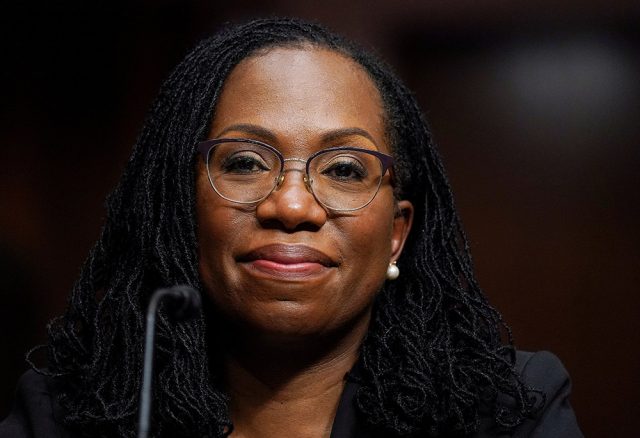
By Ryan Michaels
The Birmingham Times
With the U.S. Supreme Court entering its summer recess, Justice Ketanji Brown-Jackson, the newest to the bench, wraps her first year on the court, a year which many legal scholars say has already set her apart.
“She’s just showed up from day one,” Terry Maroney, a Vanderbilt Law School professor who studies judicial decision-making and behavior, told Reuters. “She knows what she’s doing, she’s not shy, she’s posing uncomfortable hypotheticals—and she’s not afraid to do those things even if it’s causing discomfort.”
First nominated by President Joe Biden in February 2022 and confirmed by the Senate that same April, Brown-Jackson is the first Black woman to serve on the High Court.
In June, the Supreme Court shocked many when it decided, 5-4, that Alabama congressional maps did not adequately represent Black voters and obligated the State Legislature to redraw the maps.
Brown-Jackson made “what was arguably her strongest impression” on the second day of arguments for the case in October, according to ABA Journal.
While Alabama’s solicitor general, Edmund G. LaCour Jr., defended the map, saying that sorting voters by race was prohibited by the 14th Amendment, Brown-Jackson pushed back.
“Why is it that you think that there’s a 14th Amendment problem” with changes that a three-judge federal district court ordered to the remap, Jackson asked LaCour during the Oct. 4 arguments in Allen v. Milligan.
“I don’t think that the historical record establishes that the founders believed that race neutrality or race blindness was required, right?” Jackson continued, adding that the 14th Amendment “was drafted to give … a constitutional foundation for a piece of legislation that was designed to make people who had less opportunity and less rights equal to white citizens.”
The New Republic said she “vigorously debunked the right’s shameless revisionist history of the 14th Amendment.”
In addition to the court’s decision in favor of Black voters in Alabama, Brown-Jackson’s session on the court has also seen conservatives side with liberals in favor of legal interpretations favoring Native American adoption laws.
“Person of Heft…High Intellect”
Jackson’s presence may have aided in those outcomes, according to Boston College constitutional law expert Kent Greenfield.
“She’s a person of heft, a person of high intellect and she’s not being quiet. She’s very self-aware of the role she’s playing,” Greenfield told Reuters.
“My sense is she will have a disproportionate amount of influence over her colleagues, especially with the question of race,” Greenfield said.
Brown-Jackson is also the first former public defender to sit on the Supreme Court, a fact which some have said distinguishes her opinions on criminal justice issues.
Thomas A. Berry, a research fellow at the libertarian Cato Institute in Washington, D.C., said he was impressed by Jackson’s dissent in United States v. Hansen, a June 23 decision that upheld a federal law that criminalizes certain solicitation of unlawful immigration.
Jackson, in a dissent joined by Sotomayor, said the majority essentially rewrote a provision of the statute to avoid declaring it overbroad under the First Amendment.
“People wondered whether Jackson’s experience as a public defender might add to the perspective she brings to the bench. I think that does shine through in her Hansen opinion when she talks about the government having its cake and eating it too,” Berry told ABA Journal.
“Hit The Ground Running”
Ralph Richard Banks, a professor at Stanford Law School and faculty director of the Stanford Center for Racial Justice, said Brown-Jackson has come onto the Court prepared.
“She has hit the ground running. She seems to have already found her voice, both literally in oral arguments and in her opinions,” Banks told ABA Journal.
Ilya Somin, a professor at Antonin Scalia Law School at George Mason University, says Jackson wrote one of her most significant dissents in Jones v. Hendrix, a 6-3 decision that held a federal prisoner had no right to file an innocence claim if they had already challenged their conviction.
Jackson wrote a lengthy solo dissent saying she was “deeply troubled by the constitutional implications of the nothing-to-see-here approach that the majority takes with respect to the incarceration of potential legal innocents.”
Jackson “does a good job of explaining what the majority missed,” Somin told ABA Journal.
“Her unabashed willingness to articulate a perspective that is contrary to that held by the majority of justices has made her the most formidable dissenting voice on the court,” Sherrilyn Ifill, a prominent civil rights lawyer, told NBC News.
However, Brown-Jackson has also been a voice of the majority, having been on the winning side of 84% of decisions the Supreme Court has made in its nine-month session, according to NBC News. That’s more than the other two liberal justices, as well as conservative Justices Clarence Thomas, Neil Gorsuch and Samuel Alito.
Away from the Court, Jackson has also made it a point to speak to law students and focus on her family and other passions like musical theater and the reality TV game show “Survivor.”
“I have found that when I’m in unfamiliar surroundings, facing new and daunting challenges, one of the things I do is to focus on the constants, the things outside the law that form a central part of my life and that bring me joy,” Jackson said to Boston University School of Law graduates on May 21. “And for me, that constant outside thing, in addition to my wonderful family, has always been the performing arts and especially musical theater.”



